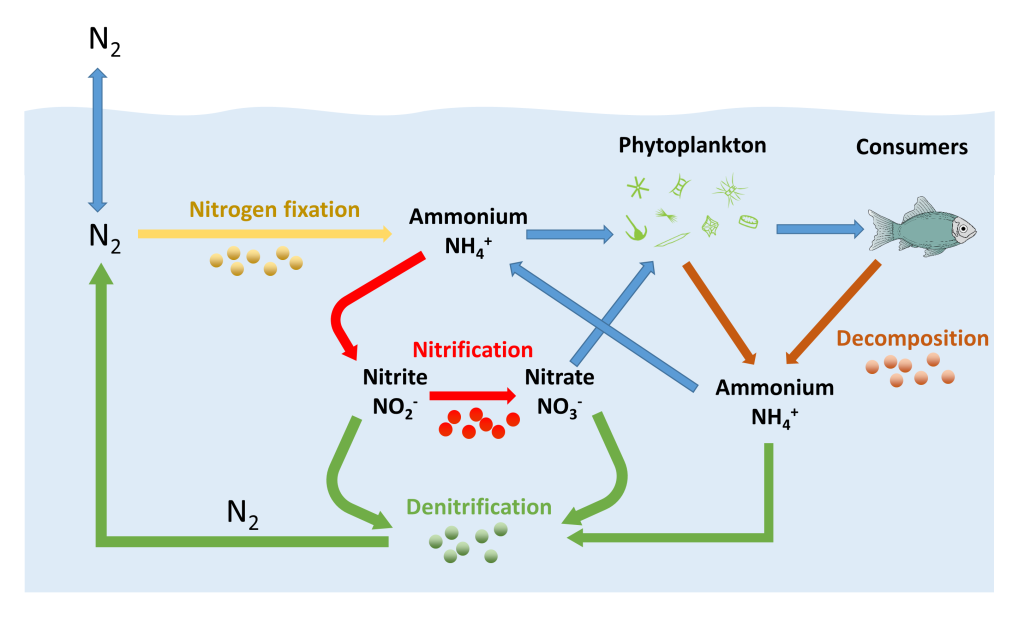
Simplified nitrogen cycle in the ocean. Colored dots represent the marine bacteria responsible for nitrogen cycling (PW). https://rwu.pressbooks.pub/webboceanography/chapter/5-6-nitrogen-and-nutrients/
The Tier 1 article introduced that there are various levels of water parameters the saltwater aquarium hobbyist must understand. Depending on the goal of the system and the livestock you are trying to maintain, certain parameters will have varying weights of importance. The criticality will come down to the needs of the organisms naturally. In addition to proper lighting and flow, water chemistry is usually the hardest to grasp. This is due to the fact that it is not easy to decipher without proper chemical testing to quantify. Mastering the proper titration techniques for repeatability can also be a challenge to new hobbyists.
Tier 2 water parameters I would consider are dissolved nutrients. This is contributed by livestock metabolism, waste, and decaying organic matter. If you are keeping “Fish Only with Liverock (FOWLR)” or soft corals then the ranges are typically more forgiving, while stony corals that require calcification are more critical. Assume that the biological filters with denitrifying bacteria are well established at the initial phase of starting the system. Maintaining the required levels will be determined by the system bioload. The ebb and flow of this may require adjusting feeding habits, maintenance routines, and the additions/subtractions of mechanical & chemical filtration as it changes.
The bioload is really the key. The proper stocking level for the total water volume is critical. Always err on the lower side with slow livestock additions over time and allow the system to acclimate to the additions. Photosynthetic corals are also consumers of some of the nitrates and phosphates in the water column so it cannot be completely 0 ppm. Excessive nutrient levels, on the other hand, can impede growth of stony corals and increase unwanted algae.
Nitrogen Cycle & Nutrients Levels
-
Cycling the Tank (Ammonium, Nitrite, Nitrate, Phosphates)
- Measurement Options: Manual Titration Test Kit, Handheld Colorimeter, Automated Tester (Keep in mind ALL automated testers require regular maintenance to function correctly)
- Nominal Range
- A balanced system should be able to maintain Nitrates at acceptable levels.
- Nitrates (NO3)= range (1-10ppm) preferred *
- Phosphates (PO4)= range (0.01-0.10 ppm) preferred *
* Ranges referred by Bulk Reef Supply
- Remediation:
- Low Nitrates and Phosphates – Increase Fish Bioload and feed more, manually dose Nitrate/Phosphate supplements based on test results
- Excessive Nitrates and Phosphates- Increase Nutrient export (Water Change & remove detritus, ensure skimmer is adjusted properly, proper use of refugium/algal filter, use of chemical filtration, carbon dosing) or reduce your current bioload – It might be overstocked.
Summary
When it comes to nutrients in the water, it is all about balance. The water volume is a constant. The inputs and outputs need to balance in order to maintain equilibrium. Do not forget as your live stock grows, they will require more food and produce more waste. Even coral colonies consume more as they grow. Sudden changes in the livestock density or the addition of chemical filtration, such as carbon and granular ferric oxide, will cause spikes that the organisms won’t react too kindly to. So be vigilant. Understand how things look when everything is heathy and in balance. A visual indicator is your best reference before you dive too deep into testing. Soon you will find that water testing is a necessary tool for longevity once you determine the cadence based on the maintenance routine you are comfortable with.
The Tier 3 water parameters will dive into the “Big 3” elements for stony corals. I will explore that in the next article.
Happy Reefing!










0 Comments